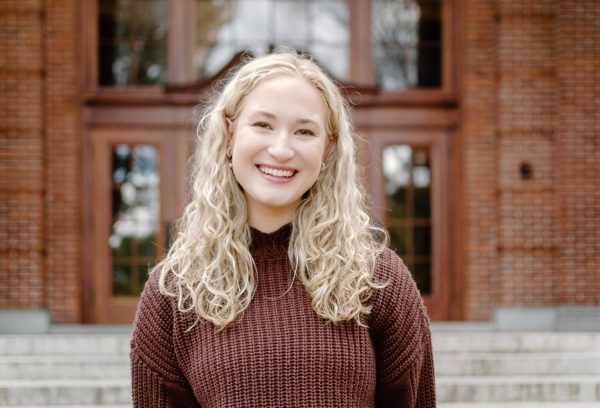ASOSU presidential debate highlights mental health, sustainability and safety
Vice Presidential candidate Angelo Arredono (left, he/him), Presidential Candidate Julia Hayes (she/her), Presidential Candidate Carissa O’Donnell (she/her), and Vice Presidential Candidate Dakota Canzano (she/her) speaking on their respective campaigns at the ASOSU presidential debate in Memorial Union on March 3rd.The candidates spoke on issues involving student mental health, student employment, student involvement in ASOSU government, and more.
March 5, 2023
Political transparency, student fees, equitable wages, student outreach, mental health and sustainability were main topics of discussion during the Associated Students of Oregon State University presidential debate on March 3.
Moderated by current ASOSU Vice President Sierra Young, the two presidential tickets: Julia Hayes, president; Angelo Arrendondo, vice president, and Carissa O’Donnell, president; Dakota Canzano, vice president; answered prearranged questions as well as questions from the public.
The debate started with four-minute introductions from both presidential tickets, followed by prepared questions from Young, thirty second responses from each presidential ticket, questions from the public and two-minute closing remarks.
O’Donnell and Canzano began the introduction, followed by Hayes and Arrendondo.
“We know the capabilities of ASOSU as well as the increased responsibility and accessibility that we will have as both president and vice president,” O’Donnell said. “With this in mind, we created our administrative pillars bridging the gap, accessible mental health care and communal advocacy to both reflect the priorities of students that we have connected with and to promote an agenda that we can commit to achieving.”
According to Canzano, they have connected with hundreds of students and met with over 40 organizations on campus that have allowed them to connect with different cultural groups and all walks of life.
O’Donnell highlighted the policies of the presidential ticket’s campaign which was bridging the gap between the student body and ASOSU, ensuring students are aware of the resources accessible to them and how they can get involved.
“Angelo and I came up with our slogan: ‘Together OSU,’ with the promise that we will engage students in our decision making and in the operations of ASOSU as a whole,” said Hayes in her opening remarks. “We’re aware that there’s a lack of communication from our student government to the entire or majority of the student population. Our campaign is centered around meeting with clubs, organizations, fraternities, sororities, cultural centers and classes.”
Hayes went directly into the ticket’s policies which included what she noted as “protecting Beavers.” Through taking action to provide an equitable wage for student employees, improving health and wellness with sleeping pods, support and accountability for survivors of sexual assault within the greek life community and outside, renter protections, effective transportation methods and transparency.
Arredondo followed with more policies like expanding transparency, tabling, prioritizing inclusion and accessibility, improving relationships with cultural centers and improving accessibility to emergency contraception.
In a series of questions asked by Young, the first asked about specific actions the ticket’s administration would take in order to make ASOSU more transparent.
“A lot of students that we’ve talked to and engaged with are not even aware that there’s a student government on campus,” Hayes said. “So with our administration, we would commit to having continued engagement with various clubs and organizations to continue to update them on projects and initiatives that ASOSU is working on.”
Arredondo followed with the idea of pushing the ASOSU newsletter and notifying students of senate meetings.
“For us, it just means bringing students back into student government,” O’Donnell said. “So we’ve committed to making our administration more accessible to the students. So having greater student involvement will again, bridge the gap.”
Canzano mentioned how the ticket plans to make a Student Fee Committee recap for their multiple-hour-long meetings.
Young inquired about how the candidates will prioritize resources for students’ mental health, and how they plan to advance resources in regards to this topic.
“We plan to work with CAPS at an institutional level: what this looks like is attending board meetings because currently, CAPS has about 26 employees for 30,000 students, and that is not enough,” Canzano said. “This is a time sensitive issue.”
According to O’Donnell, they plan to take a seat on the student advisory board and advocate for better representation when it comes to the staff CAPS employs, including higher wages for CAPS employees.
Hayes rebutted with the fact the Diversity Equity and Inclusion Coordinator or the LGBTQ+ Coordinator are already on those hiring groups for CAPS.
O’Donnell responded with how the two coordinators are part of the CAPS advisory board, but that there are other seats within ASOSU. The ticket plans to take those seats and within their administration work to see how they can best represent students.
In terms of a quicker fix for mental health crises, Hayes and Arredondo mentioned their previous policy to incorporate sleeping pods in places like the library and the health and wellness center due to correlations between sleep deprivation and mental health.
In terms of advocating for queer students and increasing resources, O’Donnell said the ticket has been working to eradicate concerns surrounding single-use restrooms by planning to provide resources to better locate them.
According to Hayes, the lack of single-use restrooms is on the ticket’s radar, especially in dorms and older buildings, as well as inclusive changing rooms and restrooms in Dixon Recreation Center.
As for sustainability, O’Donnell and Canzano mentioned more accessibility to sustainable options, a bike share program, meat alternatives and compost programs for sorority and fraternity life.
According to Hayes, her ticket plans to add biodegradable products in dining halls and upkeep gardens around campus for fresh food.
O’Donnell rubutted with the fact University Housing and Dining had so-called biodegradable silverware in their dining halls in the past that ended up not being truly biodegradable, so they lost their contract to do so in the future.
To combat racism, Hayes said it all comes down to having tough conversations she’s willing to have. Arredondo mentioned working with the administration to change systemic racism in OSU policies.
In regards to questions about parking on campus, O’Donnell said she is currently on the campus improvements committee working on providing parking passes for low-income students.
According to Hayes, the ticket plans to subsidize parking passes for low-income students and spread the word about public and campus transportation.
A few out of the approximately thirty attendees asked clarifying questions of the tickets on topics such as time management, the bike-share program, how the tickets plan to allocate student funds, as well as mental health resources.
In their final remarks, Hayes said the attendees had just listened to four human beings — not politicians — but students working to improve campus.
“It is clear that our ticket is most qualified to take on this big responsibility. Angelo and I are aware of how much work it will take to get something done in one year, during our administration, we will commit to following through on our goals, because we know exactly how to implement them by using our resources,” Hayes said.
According to O’Donnell, the ticket enjoyed the weeks of reaching out to students and hearing their needs and concerns.
“We’re asking each and every single one of you in this room right now to join us in bridging the gap,” Canzano said. “Let’s create transparency between ASOSU and the student body. Let’s create more green infrastructure. Let’s provide more mental health resources and have a say in where the student fees go. And let’s make campus a community where our advocacy and equity is prioritized.” The presidential debate was recorded and will be posted on the ASOSU website for all to view.












































































































